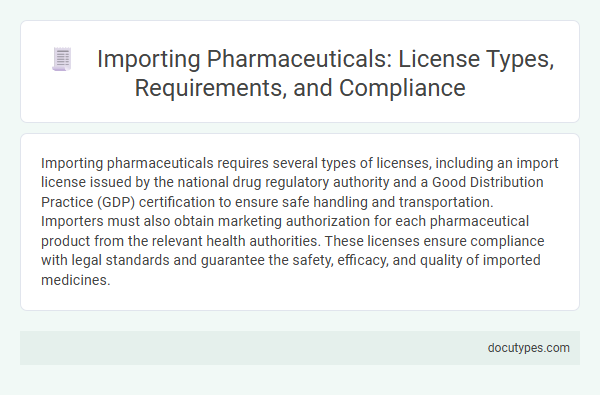Importing pharmaceuticals requires several types of licenses, including an import license issued by the national drug regulatory authority and a Good Distribution Practice (GDP) certification to ensure safe handling and transportation. Importers must also obtain marketing authorization for each pharmaceutical product from the relevant health authorities. These licenses ensure compliance with legal standards and guarantee the safety, efficacy, and quality of imported medicines.
Introduction to Pharmaceutical Importation
| Introduction to Pharmaceutical Importation | |
|---|---|
| Pharmaceutical Importation | The process of bringing medicinal products from foreign manufacturers into a country for distribution or sale. Requires strict regulatory compliance to ensure product safety and efficacy. |
| Types of Licenses Needed | |
| Import License | Official authorization issued by national health or drug regulatory authorities to import pharmaceuticals. Ensures control over drug quality and adherence to legal standards. |
| Wholesale Distribution License | Required for entities involved in the storage and distribution of imported pharmaceuticals before sale to pharmacies or hospitals. Ensures good distribution practices (GDP). |
| Good Manufacturing Practice (GMP) Compliance Certification | Certification demonstrating that imported products are manufactured according to international GMP standards. Vital for regulatory acceptance and market approval. |
| Customs Clearance Documentation | Not a license but mandatory paperwork including import forms, invoices, and certificates of analysis required by customs authorities for legal entry of pharmaceuticals. |
| Marketing Authorization | Permission granted by medical regulatory bodies to market and sell imported pharmaceutical products within the country. Confirms the product's safety, quality, and efficacy. |
Overview of Import License Types
Importing pharmaceuticals requires specific licenses to ensure compliance with national and international regulations. These licenses verify that the products meet safety, quality, and efficacy standards before entering the market.
Common import licenses include the Importer Drug License, Drug Establishment License, and Special Import License. Each type addresses different aspects such as product category, quantity, and intended use, ensuring regulatory oversight throughout the supply chain.
Eligibility Criteria for Import Licenses
Importing pharmaceuticals requires specific licenses regulated by health authorities to ensure safety and compliance. Eligibility criteria for these licenses focus on legal, professional, and infrastructural standards to prevent unauthorized distribution.
- Valid Business Registration - Importers must have legally registered businesses to apply for pharmaceutical import licenses.
- Qualified Personnel - A licensed pharmacist or qualified technical staff must be part of the importing entity to meet regulatory requirements.
- Appropriate Storage Facilities - Importers need certified storage and handling facilities to maintain pharmaceutical product integrity.
Key Regulatory Requirements
Importing pharmaceuticals requires strict compliance with regulatory authorities to ensure product safety and efficacy. Different types of licenses are mandated depending on the jurisdiction and specific pharmaceutical products involved.
- Import License - Authorization granted by regulatory agencies to legally import pharmaceutical products into a country.
- Wholesale License - Required for businesses distributing imported pharmaceuticals to wholesalers, pharmacies, or healthcare providers.
- Good Manufacturing Practice (GMP) Certification - Certification ensuring imported pharmaceuticals meet quality and safety standards as per regulatory guidelines.
Documentation Needed for Import Approval
Importing pharmaceuticals requires specific licenses such as an Import Drug License issued by the national regulatory authority. Documentation needed for import approval includes the Import License, Certificate of Analysis, and Good Manufacturing Practice (GMP) certification. Additional documents like the Drug Registration Certificate and Free Sale Certificate are essential to ensure compliance with regulatory standards.
Licensing Process and Application Steps
What types of licenses are needed for importing pharmaceuticals? Importing pharmaceuticals requires obtaining specific licenses such as an import license, a pharmaceutical distribution license, and possibly a wholesale drug license. These licenses ensure compliance with regulatory standards governing drug safety and quality.
What is the licensing process for importing pharmaceuticals? The process involves submitting detailed documentation including import applications, proof of Good Manufacturing Practice (GMP) compliance, and company credentials to the relevant drug regulatory authority. Each application undergoes thorough evaluation to verify adherence to national and international pharmaceutical regulations.
What are the key application steps for pharmaceutical import licenses? You must complete the application form, provide requisite certifications like product registration and quality control data, and pay any applicable fees. After document submission, an inspection or audit by the regulatory body may be required before the license is granted.
Compliance Standards and Best Practices
Importing pharmaceuticals requires obtaining specific licenses such as an Import License issued by the national regulatory authority and a Good Manufacturing Practice (GMP) certification to ensure product quality. Compliance with the World Health Organization (WHO) standards and local health regulations is mandatory for legal importation.
Adhering to strict documentation procedures, including registration certificates and safety data sheets, supports regulatory compliance throughout the import process. Best practices involve regular audits, continuous training on regulatory updates, and maintaining transparent communication with regulatory bodies to avoid licensing issues.
Common Challenges in Import Licensing
Importing pharmaceuticals requires specific licenses such as an Import Drug License and a Good Manufacturing Practice (GMP) certificate to ensure compliance with regulatory standards. Common challenges in import licensing include navigating complex regulatory requirements, lengthy approval processes, and stringent quality control measures. Delays in documentation verification and varying international regulations further complicate the import licensing process for pharmaceutical products.
Penalties for Non-Compliance
Importing pharmaceuticals requires specific licenses such as an Import Drug License and a Wholesale Drug License to ensure compliance with regulatory standards. These licenses verify that the imported products meet safety, quality, and legal requirements set by health authorities.
Failure to obtain the necessary licenses can result in severe penalties including heavy fines, seizure of goods, and legal prosecution. Regulatory bodies may suspend or revoke business operations for non-compliance. Maintaining proper licensing safeguards the importer from legal risks and supports public health safety.
What Types of Licenses Are Needed for Importing Pharmaceuticals? Infographic

